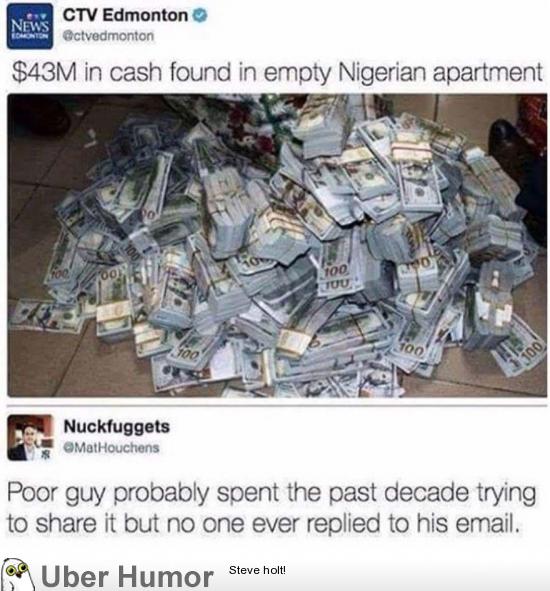Ever heard of the Nigerian Prince Scam Meme? It’s one of those internet phenomena that has taken the world by storm. You know, the emails you get from some distant royalty promising you millions if you just send them a little cash first. Well, it’s not just a joke—it’s a cultural artifact that’s shaped how we view online scams today.
But here’s the thing, the Nigerian Prince Scam isn’t just about fake princes or ridiculous promises. It’s a tale of human psychology, digital deception, and how memes can turn something sinister into something hilarious. So, buckle up, because we’re about to dive deep into the world of internet scams and why this particular one became so iconic.
Let’s face it, the internet is full of weird stuff. From cat videos to deep web mysteries, there’s always something strange lurking around the corner. But nothing quite compares to the charm—and absurdity—of the Nigerian Prince Scam Meme. It’s not just a scam; it’s a cultural phenomenon that’s been dissected, parodied, and celebrated in equal measure. And hey, who doesn’t love a good laugh at the expense of some overly ambitious fraudsters?
Read also:Donna Kelce Hospitalized The Untold Story Behind The Headlines
What is the Nigerian Prince Scam?
The Nigerian Prince Scam, also known as the "419 scam," is one of the most infamous online cons in history. Named after Section 419 of the Nigerian Criminal Code, this scam involves emails or letters from someone claiming to be a wealthy Nigerian prince—or some other high-ranking official—who needs your help to transfer large sums of money out of the country. In return for your assistance, they promise you a hefty cut of the funds.
Of course, there’s a catch. To "help" them, you need to send them money upfront for things like legal fees, bribes, or administrative costs. Once you do that, guess what? They disappear, leaving you poorer and wiser. It’s a classic case of "too good to be true," but surprisingly, it worked on many people back in the day.
How Did the Nigerian Prince Scam Start?
Believe it or not, the Nigerian Prince Scam didn’t start with the internet. Its roots go way back to the 19th century when con artists would send letters claiming to be from foreign royalty. Back then, it was called the "Spanish Prisoner Scam," where scammers pretended to be imprisoned nobles needing financial assistance to secure their freedom.
Fast forward to the 1980s, and Nigeria became the new hotspot for these kinds of scams. With the rise of email in the 1990s, the scam evolved into its digital form, reaching millions of unsuspecting victims worldwide. The Nigerian Prince Scam became so widespread that it even earned its own Wikipedia page, solidifying its place in internet lore.
Why Did the Nigerian Prince Scam Become So Famous?
Okay, so why did this particular scam become so iconic? Well, it’s all about the absurdity of it. I mean, come on, a prince asking for your help via email? It’s like something out of a bad movie, but that’s exactly what makes it so memorable. The sheer audacity of the scammers is what sets it apart from other cons.
Plus, the language used in these emails is often hilariously bad. Poor grammar, misspellings, and overly dramatic phrases make them ripe for mockery. It’s like the scammers didn’t even try to make it believable, which only adds to the charm. And let’s not forget the sheer audacity of asking strangers to hand over thousands of dollars without any proof. It’s the perfect setup for a meme.
Read also:Who Is Gibson Makhanda Unveiling The Man Behind The Name
The Role of Memes in Popularizing the Scam
Memes played a huge role in turning the Nigerian Prince Scam into a cultural phenomenon. By the early 2000s, the internet was buzzing with parodies and jokes about these emails. People started creating memes that highlighted the ridiculousness of the scam, using phrases like "I am the prince of Nigeria" and "send me your bank details." These memes spread like wildfire, turning the scam into a global joke.
Some of the most famous Nigerian Prince Scam memes include:
- "I am the prince of Nigeria" memes featuring photoshopped images of people posing as royalty.
- "Send me your bank details" jokes that mock the scammers’ requests for personal information.
- Parodies of the emails themselves, complete with exaggerated grammar mistakes and over-the-top promises.
The Psychology Behind the Scam
But here’s the thing—why do people fall for it? Despite its obvious flaws, the Nigerian Prince Scam has duped countless individuals over the years. The answer lies in psychology. Scammers exploit basic human desires, such as greed, curiosity, and the desire to help others. By promising vast wealth in exchange for a small investment, they tap into our natural inclination to take risks for potential rewards.
Additionally, the scam often plays on people’s emotions, making them feel like they’re helping someone in need. Combine that with poor financial literacy and a lack of awareness about online scams, and you’ve got a recipe for disaster. It’s a stark reminder of how vulnerable we can be in the digital age.
Common Tactics Used by Scammers
Scammers employ a variety of tactics to make their schemes more convincing. Here are some of the most common ones:
- Urgency: They create a sense of urgency, telling victims that they need to act fast to claim their prize.
- Flattery: They shower victims with compliments, making them feel special and important.
- Authority: They pretend to be in positions of power, using titles and official-sounding language to gain trust.
These tactics are designed to bypass our critical thinking and appeal to our emotions, making it easier for scammers to succeed.
The Impact of the Nigerian Prince Scam
While it may seem like harmless fun, the Nigerian Prince Scam has had a significant impact on both individuals and society as a whole. On a personal level, victims often lose thousands of dollars, sometimes even their life savings. The emotional toll can be just as devastating, leaving people feeling foolish and violated.
On a broader scale, the scam has contributed to negative stereotypes about Nigeria and its people. Despite efforts by the Nigerian government to combat online fraud, the country is still associated with these kinds of scams in the minds of many. It’s a reminder of how damaging misinformation can be, both online and offline.
Efforts to Combat the Scam
Thankfully, there are efforts underway to fight back against the Nigerian Prince Scam. Law enforcement agencies around the world have cracked down on scammers, arresting and prosecuting those responsible. Additionally, awareness campaigns have helped educate the public about the dangers of online fraud, encouraging people to think twice before clicking on suspicious links or emails.
Organizations like the Federal Trade Commission (FTC) and the Internet Crime Complaint Center (IC3) provide resources and support for victims of online scams. By reporting suspicious activity and sharing information, we can all play a part in reducing the prevalence of these cons.
The Evolution of Online Scams
As technology continues to evolve, so do the methods used by scammers. While the Nigerian Prince Scam may seem outdated now, it paved the way for more sophisticated schemes. Today, we face threats like phishing attacks, ransomware, and identity theft, all of which are far more dangerous than their predecessor.
However, the lessons learned from the Nigerian Prince Scam remain relevant. By staying vigilant and educating ourselves about the warning signs of fraud, we can protect ourselves and others from falling victim to these scams. It’s a constant battle, but one that we can win if we work together.
Modern-Day Scams Inspired by the Nigerian Prince Scam
Here are a few examples of modern scams that take inspiration from the Nigerian Prince Scam:
- Lottery Scams: Victims are told they’ve won a lottery they never entered and need to pay fees to claim their prize.
- Investment Scams: Scammers pose as financial advisors, promising high returns on investments that don’t exist.
- Romance Scams: Fraudsters create fake online profiles, pretending to be in relationships to extract money from their victims.
These scams may be more advanced, but they rely on the same psychological tricks as the Nigerian Prince Scam. By recognizing these patterns, we can better protect ourselves from becoming victims.
Why the Nigerian Prince Scam Meme Matters Today
Even though the Nigerian Prince Scam itself has largely faded into obscurity, its legacy lives on through memes. These memes serve as a reminder of how far we’ve come in terms of digital literacy and cybersecurity awareness. They also highlight the power of humor in combating online fraud, showing that we don’t have to take these scammers too seriously.
Moreover, the Nigerian Prince Scam Meme is a testament to the creativity and ingenuity of internet culture. It’s proof that even the darkest corners of the web can inspire laughter and joy, as long as we approach them with the right mindset.
Lessons We Can Learn from the Nigerian Prince Scam
So, what can we learn from all of this? Here are a few key takeaways:
- Be Skeptical: If something seems too good to be true, it probably is.
- Verify Information: Always double-check the legitimacy of emails, links, and offers before taking action.
- Stay Informed: Keep up with the latest trends in online scams to stay one step ahead of the bad guys.
By following these simple guidelines, we can all do our part to make the internet a safer place for everyone.
Conclusion
In conclusion, the Nigerian Prince Scam Meme is more than just a joke—it’s a cultural artifact that reflects our relationship with the internet. From its humble beginnings as a simple email scam to its current status as a meme legend, it’s a story of human folly, creativity, and resilience. While the scam itself may have faded into the background, its lessons remain relevant today.
So, the next time you see a Nigerian Prince Scam Meme, take a moment to appreciate its place in internet history. And remember, always think twice before clicking on that suspicious email. After all, you never know who—or what—might be lurking behind it.
Got any thoughts or questions about the Nigerian Prince Scam? Drop a comment below and let’s keep the conversation going. And hey, while you’re at it, why not share this article with your friends? Who knows, you might just save someone from becoming a victim of a scam. Stay safe out there, folks!
Table of Contents
- What is the Nigerian Prince Scam?
- Why Did the Nigerian Prince Scam Become So Famous?
- The Psychology Behind the Scam
- The Impact of the Nigerian Prince Scam
- The Evolution of Online Scams
- Why the Nigerian Prince Scam Meme Matters Today
- How Did the Nigerian Prince Scam Start?
- The Role of Memes in Popularizing the Scam
- Common Tactics Used by Scammers
- Lessons We Can Learn from the Nigerian Prince Scam

